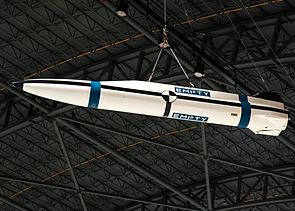AGM-131 SRAM II
| AGM-131 SRAM II | |
|---|---|
| General Information | |
| Type | Air-to-surface missile |
| Country of origin |
|
| Manufacturer | Boeing |
| development | 1986 |
| Commissioning | Development stopped in 1991 |
| Technical specifications | |
| length | 3.18 m |
| diameter | 390 mm |
| Combat weight | 900 kg |
| drive | Solid rocket engine |
| speed | above Mach 2.0 |
| Range | 400 km |
| Furnishing | |
| steering | Inertial navigation system |
| Warhead | W89 nuclear warhead 200 kt |
| Detonator | Programmed detonator |
| Weapon platforms | Bombers and fighter planes |
| Lists on the subject | |
The AGM-131 II SRAM ( S hort- R reasonable A ttack- M issile) was an air-to-surface missile Company Boeing with nuclear warhead . It should replace the AGM-69 SRAM . As a result of the geopolitical changes with the end of the Cold War and due to technical problems, the program was canceled.
Planning for the SRAM II originally began in 1977 under the name AGM-69B SRAM B. It was to be used by the Rockwell B-1 A. However, when the then US President Jimmy Carter stopped the B-1A program on June 30, 1977 , this was also the end for the SRAM B. In 1981 it was decided to further develop the B-1 into the B-1B. The development contract was awarded to Boeing in 1986. They did not want to fall back on the old AGM-69, but developed a completely new air-to-ground missile . The AGM-131 should not only be smaller, but also lighter and simpler than the AGM-69. It was planned that a B-1B could transport 36 AGM-131s.
Although only a few SRAM II were produced, the AGM-131B SRAM-T (SRAM-Tactical) was developed. This variant should be used by the F-15E Strike Eagle . It completed the first test starts before both programs, together with the development of the W89 and W91 nuclear warheads , were discontinued by US President George HW Bush in September 1991 .
